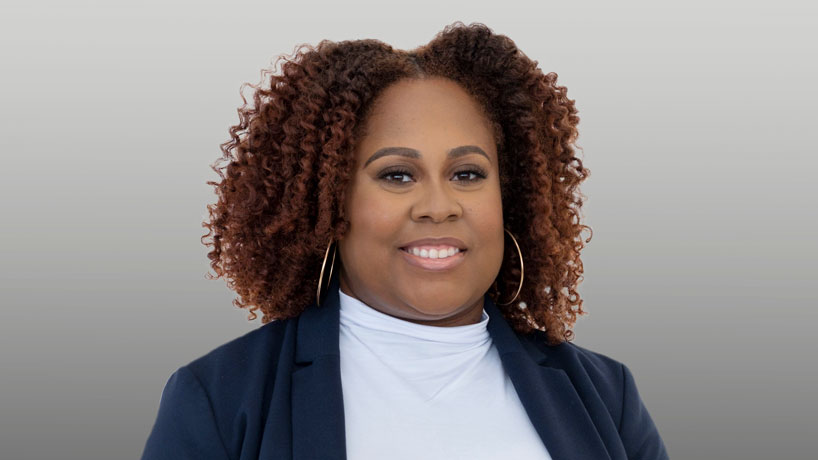
UMSL young alumni award recipient and SIUE professor, Candace Hall is working to build supportive community in the hopes of welcoming and retaining black faculty at her institution and beyond with her documentary, “clusterluck.” (Photo by August Jennewein)
Candace Hall originally thought she was going to become a journalist when she was pursuing her bachelor’s degree in English at the University of Missouri–St. Louis.
But she found herself turned off journalism when a story she wrote on the topic of race for the university’s student newspaper, “The Current,” led to some critical responses online. She remembers feeling attacked reading some of the comments, and the experience made her start thinking about other potential careers.
Hall, who was named the recipient of UMSL Young Alumni Award last fall, ended up pursuing a doctorate in education and eventually joined the faculty at Southern Illinois University Edwardsville, where she now serves as the graduate program director and is an assistant professor for the Higher Education and Student Affairs Program.
In addition to teaching the courses, professional development and diversity in higher education, Hall – a self-described creative academic – is also helping to forge more inclusive spaces for Black scholars. Drawing on her long-held interest in storytelling, she recently documented the experience in a new film titled “clusterluck.”
The documentary, directed by Cami Thomas, follows Hall and several other Black faculty members at SIUE who arrived at the university as part of a cluster hire in 2020. It explores the experience and significance of entering a predominantly white institution as a Black educator with others of the same identity.
According to a study by the American Association of University Professors that came out in December of 2020, less than 6% of faculty at public and private nonprofit four-year colleges in the U.S. are Black compared to over 70% being white. Feelings of isolation and lack of equity account for why Black faculty members leave historically and predominantly white colleges and universities.
Hall – who married fellow UMSL graduate Dorian Hall, the director of the Millennium Student Center and the Office of Student Involvement and Event Services – wanted to address the challenges experienced by Black faculty members with the creation of a supportive group and the exploration of its impact in film.
“Community is a big thing that we’ve talked about in the documentary, about something that we’re related to something that’s helping to sustain us and retain us,” she said. “Usually there’s maybe one in a department or maybe two, if you’re lucky, but not five out of 12. Right? It’s all because we have a community, because we can work in spaces where we understand each other. There’s some things we don’t have to explain. We’re not dealing with the constant microaggressions and racism that distract us from doing our jobs. That is a part of our experience, and community is a part of helping to retain us.”
Community, the principal theme of “clusterluck”, is an important element in retaining Black faculty in higher education. When Hall was deciding how to demonstrate this effectively, instead of writing a paper, a standard practice in her field, she opted to provide a visual narrative of the impact community can have on Black scholars.
J.T. Snipes, an assistant professor at SIUE who is featured in the documentary, thought this form of storytelling humanized Black faculty in a necessary way.
“To have a visual representation of our community is very powerful,” he said. “I think it moves people differently than words on a page. I think people can tell really great stories, but the old adage of a picture being worth 1,000 words is really true. I think there’s that significance of the community being represented in a real way.”
He also believes “clusterluck” shows the positive side of being Black faculty, as he frequently hears colleagues bemoan the challenges of the experience.
“I think she gives hope to a generation of scholars that the work we do doesn’t always have to be hard, and that our story doesn’t always have to be marked by tragedy or, harm as black people in the world,” Snipes said. “There’s beauty and joy and love in the spaces we work in.”
Hall’s documentary has had its intended impact on viewers as she’s screened it at various universities, including SIUE, Washington University in St. Louis and the University of Idaho. She has another screening scheduled for later this month at the University of Pittsburgh.
She hopes the film will also influence decision-makers in higher education to not only hire more diverse faculty but also create an environment that welcomes them.
“We can actually begin to create this, you got a model here, so you can’t say you don’t know how,” she said. “Now let’s attend to the Black faculty who aren’t having this experience. Let’s catch them up. This is a model; learn from this and get to work.”














